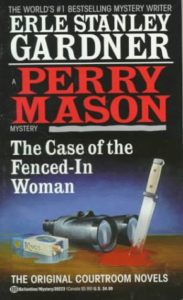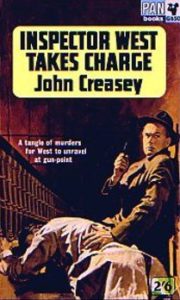Book Review: The Case of the Fenced-In Woman by Erle Stanley Gardner | Inspector West Takes Charge by John Creasey
These two books were bound together as a Detective Book Club selection and thus I am reviewing them together.
The Case of the Fenced-In Woman: While Perry Mason is best known for defending innocent people accused of murder, he does handle other cases. In this instance, Morley Eden wants to file a civil suit. It seems Mr. Eden purchased two adjacent lots of land and built his dream house on them. What he didn’t know at the time was that the seller, Loring Carson (who was also the construction foreman on the house) only had full ownership of one of those lots, with the other belonging to his estranged wife Vivian Carson.
Loring Carson has been pulling some shady stuff during the divorce proceedings, including concealing most of his assets and falsely accusing Vivian of an affair (the people who were actually having the affair are also steamed at Mr. Carson.) With the connivance of the divorce judge, Vivian got a restraining order against Morley Eden preventing him from coming on to her property, and set up a barbed-wire fence through the middle of the house to mark the border. His lawsuit against Carson will make it harder for the cad to conceal his assets.
When Mr. Carson turns up dead in the disputed house, there are plenty of people who have a motive, but the most likely suspects are Mr. Eden and Mrs. Carson. They hire Perry Mason to defend them on the murder charges, but absolutely refuse to tell their lawyer what actually happened that night. Perry’s going to have to pull some pretty spectacular courtroom antics on this one!
Erle Stanley Gardner wrote some eighty Perry Mason novels and short stories starting in 1933. A lawyer himself, Mr. Gardner’s books were accurate as to points of law (for that time in the state of California), but he often wrote Perry as getting away with stunts in court no real-life lawyer could get past a sober judge.
The books were hugely successful, and spawned several movies, a radio series (which was not faithful to the books and got retooled into the soap opera The Edge of Night) and a TV series starring Raymond Burr as Perry Mason.
This 1972 novel is late in the series, and the long-running nature of the books is acknowledged by Perry being something of a celebrity, recognized almost instantly by everyone, even during a side trip to Las Vegas. As always, however, Perry’s actual age is left up to the imagination, and he carries on his partnership with private detective Paul Drake and secretary Della Street as he has done since the 1930s.
There’s some nice puzzle elements to the case, with the layout of the divided house and grounds playing a part in the mystery. But the main draw as always is watching Perry Mason cleverly deal with police, prosecutors and judges as he proves his clients not guilty.
This isn’t the best Perry Mason book, but it’s quite enjoyable, and recommended for fans of the character.
Inspector West Takes Charge is the first in this long-running series, written in 1942. Roger West is the youngest and handsomest Inspector at Scotland Yard, and still in the early stages of his marriage to Janet. He’s introduced stumbling over a kitten, which the young couple soon adopt. (The naming of the cat is a subplot.)
The main plot is that several members of the Prendergast family, owners of the Dreem Tobacco Company, have died in the last six months. Sure, there are reasonable explanations, but three deaths in the same family within six months is statistically improbable. Inspector West and his best friend, amateur criminologist Mark Lessing, are convinced that it’s actually murder, but they have no proof.
Subsequent events establish that something is definitely amiss, but our heroes don’t know which of their several guesses is correct.
From the reader’s point of view it’s less a whodunnit (the crooked solicitor outright tells one of his minions that he’s in this up to the elbows) than a whydunnit. I mean, ownership of the tobacco company is a nice pile of money, but after inheritance taxes, attracting the attention of the police, and the worries of stockholders, and so forth, it’s not worth several murders. And to make matters more complicated, someone tries to murder the lawyer as well!
Meanwhile, World War Two is going on in the background. At first, it just causes gasoline rationing running gags and the manpower shortage is part of the reason Inspector West is allowed to delegate some of the investigation to a civilian friend. But it turns out to be much more relevant to the case than anyone had thought.
This is one of those murder mysteries where our heroes solve the case less by thinking and doing legwork than by arresting the survivor as several more murders take place during the story. It makes the book exciting, but not particularly reassuring as to Inspector West’s brainpower. Characterization is also kind of minimal and relies a bit on stock types.
To be honest, you can easily skip this book unless you’re a completist–later volumes in the series are much better. (Consider Inspector West at Home.) John Creasey wrote over six hundred novels, he’s allowed a few lesser works.
To finish, let’s have a bit of the Perry Mason TV series:


